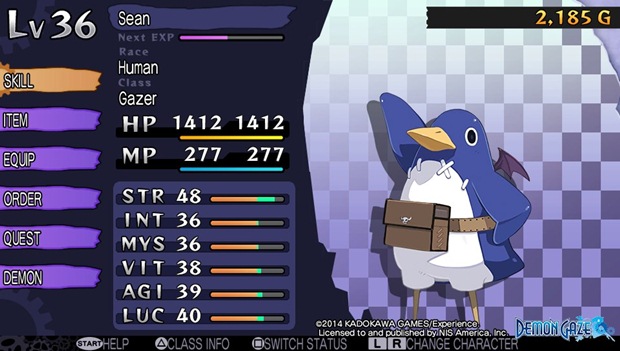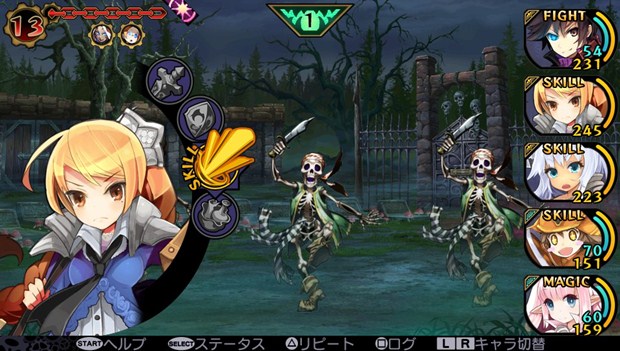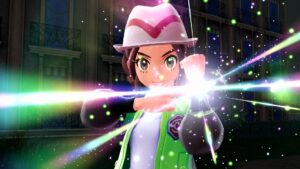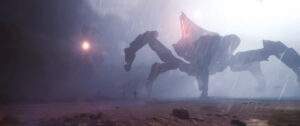
Demon Gaze begins like a rather forgettable horror movie: you wake up in a dark, unfamiliar surrounding, completely disoriented and with no memory of how you got there. As if to drive the point home, you start hearing creepy laughter in the distance. As you try to escape, you discover that the laughter emanates from a vicious, terrifying demon, and you learn that you have some exorcism powers- the power to battle and control demons, basically.
If none of that sounds flattering to you, it’s because it isn’t. One look at Demon Gaze might give off the impression that it’s a mediocre dungeon crawler made to appeal to a highly niche market in Japan. However, incredibly enough, Demon Gaze is somehow a rather competent dungeon crawling RPG that seems to work in spite of its otherwise distasteful trappings.
"If none of that sounds flattering to you, it's because it isn't. One look at Demon Gaze might give off the impression that it's a mediocre dungeon crawler made to appeal to a highly niche market in Japan. However, incredibly enough, Demon Gaze is somehow a rather competent dungeon crawling RPG that seems to work in spite of its otherwise distasteful trappings."
Demon Gaze plays like you would expect a dungeon crawler coming out of Japan to- you create a character, who is then thrown into a series of increasingly complex dungeons, which you are asked to navigate in a first person mode. Like with so many other Japanese dungeon crawlers (Unchained Blades, Shin Megami Tensei, Etrian Odyssey), movement isn’t free or 3D, but is in fact restricted to a grid, which makes the first person movement jarring at first. But you eventually get used to it (and honestly, it makes more sense in context of how this game is designed), although it might present a bit of an unnecessary learning curve for those who aren’t familiar with this genre or style of game.
The other big part of Demon Gaze is obviously the battles. The game has random battles, it has pre-determined battles that you need to trigger, and all battles are turn based and party based, meaning you and your party members (as well as the demons or monsters you battle) take turns to attack each other. The battles in Demon Gaze play out fairly by the books- your characters’ attacks and moves are determined by their class (of which there are five), as well as their equipment and gear, which is something that is in its turn gained by beating demons and collecting the loot they drop.
It all sounds fairly ordinary and standard, and it is. Demon Gaze does not necessarily set itself apart from other dungeon crawlers with any particular feature that stands out- it just does what it does well. It also, incidentally, goes out of its way to make the player’s life miserable, and that is what makes it stand out more than anything else.
"Demon Gaze is a difficult game, even for genre veterans. More difficult than Shin Megami Tensei or Etrian Odyssey, it is a game that revels in subverting your expectation and preparation, and rejoices in your look of horror as your meticulously constructed party with all your highly customized and specialized builds is wiped out in one attack by a boss that you were simply ill equipped to deal with."
You see, Demon Gaze is a difficult game, even for genre veterans. More difficult than Shin Megami Tensei or Etrian Odyssey, it is a game that revels in subverting your expectation and preparation, and rejoices in your look of horror as your meticulously constructed party with all your highly customized and specialized builds is wiped out in one attack by a boss that you were simply ill equipped to deal with. And in spite of all of this, it never feels unfair, it just feels soul crushingly difficult. Everything in Demon Gaze can be defeated- you just need to know how.
And this is what keeps you going in this game- you know that the newest boss can be defeated if you had better armor, which means you need better armor now. So you go back to fight demons, trying to harvest loot to get what you want (and the extra experience doesn’t hurt either) to get exactly what you want, until you feel confident enough to initiate combat with the boss (and get your ass handed to you) again.
Demon Gaze actually makes loot hunting a more engaging experience, over which a player has more control using its circles system. Circles are like checkpoints, where you get to rally the troops and save the game, and they also serve a story function by serving essentially as seals that you need to break open before you are permitted to face the boss (there are eight of them in each dungeon). But they also serve an ingenious function of letting you determine what kind of loot shows up in battles.
You see, by placing different kinds of gems- such as those that correspond to light armor or heavy armor, just as an example- you ensure that those kinds of items show up in battle. So if you need some more heavy armor to buff up that one guy in your party who’s vulnerable, put a light armor gem on a circle, and battle away. You’ll get lots of light armor drops.
"It's not the best game in the world, it's not the best game in its genre or on its platform, and its trappings can actively chase players away. But somehow, in spite of all of that, because of its mechanical adeptness, it remains a game that genre fans especially should check out at least once."
Similar to Shin Megami Tensei, especially, Demon Gaze also allows you to use demons in battle. Their usage in battle feels like a throwaway addition, to be honest, and was not something that I was particularly a fan of. No, what did win me over as far as demons were concerned was the passive abilities that they offer up, especially on field. Therefore, for example, they might act as a radar for treasure, or act as field shields for you.
Demon Gaze ultimately feels anachronistic- it is like a game from the NES or the SNES era, a game that throws the player into its harsh game world and offers little to no help (and it certainly looks and sounds like a game from that time period as well). That is perhaps the reason why it gets so compelling- every victory in this game is hard won, and even when it just does what is expected of it, and doesn’t do any of it particularly well or terribly, it somehow feels addictive enough to push through the forty hours of soul crushing that it subjects its players to.
It’s not the best game in the world, it’s not the best game in its genre or on its platform, and its trappings can actively chase players away. But somehow, in spite of all of that, because of its mechanical adeptness, it remains a game that genre fans especially should check out at least once.
This game was reviewed on PlayStation Vita.
Does everything well, makes loot drops more engaging, keeps players addicted
Poor production values, unnecessary titillation, plays everything by the book.



















